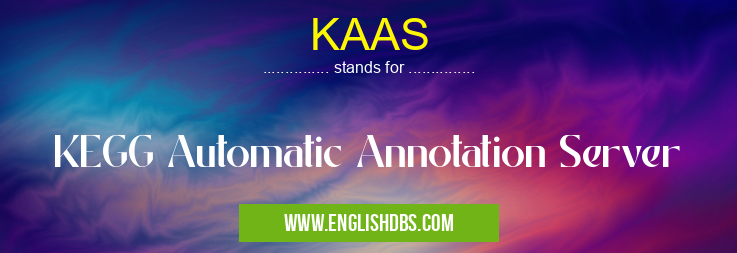What does KAAS mean in HUMAN GENOME
KEGG Automatic Annotation Server (KAAS) is an online server for the annotation of protein sequences using the KEGG orthology. This innovative tool has become increasingly popular in recent years, as it simplifies the complex process of predicting biochemical functions from DNA and proteins. KAAS automates the process of sequence analysis, making it more accessible to biologists and bioinformaticians who don't have extensive background in computational biology. With this powerful resource, researchers can quickly obtain insightful information about protein functions from amino acid sequences in a timely fashion.

KAAS meaning in Human Genome in Medical
KAAS mostly used in an acronym Human Genome in Category Medical that means KEGG Automatic Annotation Server
Shorthand: KAAS,
Full Form: KEGG Automatic Annotation Server
For more information of "KEGG Automatic Annotation Server", see the section below.
» Medical » Human Genome
What is KAAS
KAAS is an automated web-based system for annotating protein sequences using the KEGG official database. It allows users to input their own sequence data and then compare it to existing protein sequences already encoded in KEGG. Based on comparisons and annotations, the system generates a list of possible biochemical reactions that can occur with a given protein sequence, including enzyme names and KEGG pathways associated with that reaction or process. Additionally, KAAS also provides detailed information about biochemical pathways and metabolic networks associated with the submitted query sequence.
How Does It Work
The way KAAS works is fairly straightforward; first, users input either their own amino acid sequence or one provided by another source such as NCBI's RefSeq database into an online form on the server's website. Next, the user's sequence will be compared to all known proteins in the KEGG Orthology database; if any matches are found they will be displayed along with pertinent details regarding possible reaction pathways or metabolic networks associated with them. Finally, if necessary users can also manually check which specific pathway(s) are related to each match by clicking on individual links associated with each match result.
Essential Questions and Answers on KEGG Automatic Annotation Server in "MEDICAL»GENOME"
What is KEGG?
KEGG (Kyoto Encyclopedia of Genes and Genomes) is a database resource that offers information on gene/protein interactions, pathways, metabolic pathways, and more. It can be used to better understand the molecular structure and inner workings of cellular components related to various organisms including humans, plants and animals.
How does KEGG Automatic Annotation Server (KAAS) work?
KAAS utilizes sequence alignment algorithms to compare user-input query sequences with corresponding reference sequences in the Kyoto Encyclopedia of Genes and Genomes (KEGG), allowing for automated annotation of proteins using the KEGG database.
What kind of queries are supported by KAAS?
KAAS supports protein sequence queries as well as nucleotide sequence queries.
Is there an option for multiple queries within KAAS?
Yes, there is an option for uploading multiple query sequences at once in FASTA format.
Are there any limits when submitting queries to the server?
The maximum number of sequence characters allowed per query is 20,000 bases or amino acids. The recommended length should be from 30 to 120 amino acids long.
What are the output formats available in KAAS?
Output data available includes tabular annotations for each query as well as match score statistics for all matches generated by BLAST searches performed against the reference sequences contained in the database. Additionally, graphical outputs such as alignments are produced upon request.
Can I sort my output data with specific criteria within KAAS?
Yes, users can directly manipulate their output data via several sorting criteria such as e-value changes or organism groupings.
Is it safe to store my personal information in this server while performing annotation?
The KEGG Automatic Annotation Server ensures user anonymity; therefore, no personal information will be stored within our servers during your usage session on the website. Your data remains private and secure throughout your search session and upon leaving our services all logs are cleared from our system memory.
: Is it possible to link my own database entries with those found in KEGG?
Yes - users have the option to access their own results alongside pre-existent databases stored within the Kyoto Encyclopedia of Genes and Genomes (KEGG). This allows users flexibility depending on their research needs.
Final Words:
In summary, KAAS is a powerful online server for automatically annotating amino acid sequences using information stored in the KEGG database. Not only does it greatly reduce one’s time spent on manual annotation but it also provides useful insights into potential biological pathways associated with any given query sequence. By taking full advantage of this freely available resource, biologists will no doubt uncover exciting new discoveries about biological systems they are investigating; this enhanced understanding could help provide insight into many unknowns within our ever-evolving world of biology!
